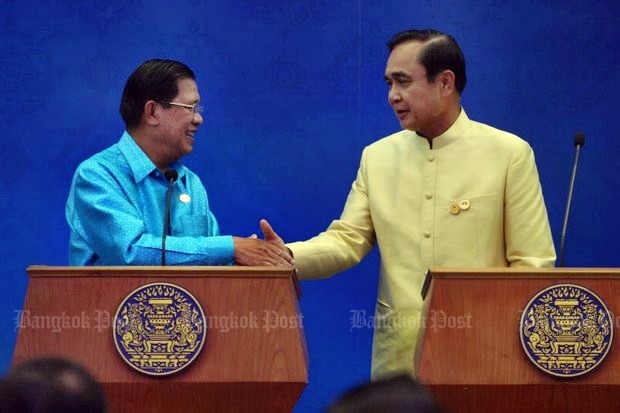
Cambodia and Thailand are going through a new stage in their bilateral relations. The two countries, whose relations had turned sour, have opened a new chapter of "win-win cooperation".
The new chapter of Thai-Cambodian relations started when Cambodia's Prime Minister Hun Sen made the first state visit to Thailand in 14 years last December, hailed by both sides as a milestone in enhancing previously frayed diplomatic relations between the two countries.
Hun Sen and his Thai counterpart Prayut Chan-o-cha had an informal meeting ahead of a joint cabinet meeting to mark 65 years of Thai-Cambodian diplomatic relations. Discussions included bilateral cooperation on regional issues to strengthen diplomatic ties.
"Currently, relations between Thailand and Cambodia have been more than normal. You see many Thai trade fairs and exhibitions have been held across Cambodia while a lot of Thai and business visitors have travelled [here] in the past year," Phay Siphan, Cambodian government spokesman, told Thai journalists who recently visited Cambodia as part of a media exchange programme between the Thai Journalists Association and Club of Cambodian Journalists.
Phay Siphan said relations between the two countries are the best they have been in a while and the two depend on each other "like a brother and sister".
After the joint cabinet meeting, Cambodian authorities headed back to Phnom Penh to determine how to implement a new policy for the benefit of both countries, said Phay Siphan.
"We are also thinking about the next joint cabinet meeting but we have not yet scheduled it," added the Cambodian government spokesman.
"We can't change many things overnight but together we can change our mindset. We must sit and talk together and respect each other's opinions. All forms of cooperation between the two countries are important."
Tensions between Cambodia and Thailand came to a head in January 2003 when riots broke out in Phnom Penh after a Cambodian newspaper incorrectly reported that Thai actress Suwanan Kongying, known as Kob, stated that Angkor Wat, Cambodia's prized heritage site, belonged to Thailand.
On Jan 29 of that year, the Thai embassy in Phnom Penh was burned, and hundreds of Thai immigrants, diplomats and businessmen fled the country to avoid violence. Thais in Bangkok protested in front of the Cambodian embassy, burning Cambodian flags. This led to the Thai government severing diplomatic ties with Cambodia.
Another long-running point of contention has been sovereignty of the 11th century Preah Vihear temple and land surrounding it. Both countries lay claim to the relic, and in 2009 exchanged fire as tensions mounted.
In 1962, the International Court of Justice ruled the temple belonged to Cambodia, though ambiguity remained over the land. In 2013, the court ruled that most of the disputed land around it should also go to Cambodia, though it said Cambodia had no jurisdiction to rule on a hill nearby.
Both governments welcomed the ruling.
Nattawut Pothisaro, Thai ambassador to Cambodia, said the two countries have agreed to put controversial issues aside in a bid to restore ties and "focus on positive issues".